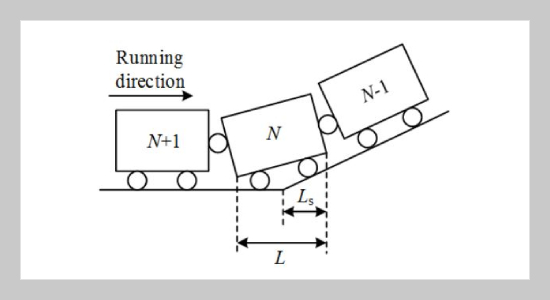Hongxia Niu1, Tao Hou 1, and Yu Chen1
1School of Automation and Electrical Engineering, Lanzhou Jiaotong University, Lanzhou 730070, China
Received:
February 25, 2022
Accepted:
June 22, 2022
Publication Date:
August 16, 2022
Copyright The Author(s). This is an open access article distributed under the terms of the Creative Commons Attribution License (CC BY 4.0), which permits unrestricted use, distribution, and reproduction in any medium, provided the original author and source are cited.
Download Citation: ||https://doi.org/10.6180/jase.202305_26(5).0009
ABSTRACT
The traditional genetic algorithm has been widely used in energy-saving optimization of train operation, but due to the uncertainty of the evolution direction of it’s population chromosomes, it has caused some problems such as a large amount of local computations, slow convergence speed, and low solution quality. To solve these problems, an improved genetic algorithm is put forward in this paper. In order to effectively reduce the traction energy consumption of high-speed trains in operation, a multi-mass point train model based on the train dynamics model and the train running time and speed as the constraints is established. The improved genetic algorithm is used to analyze the search condition of conversion point of the working conditions, and the traction-lazy mode is used to reduce the energy consumption of the trains. The improved genetic algorithm takes the minimum energy consumption of the train as the optimization goal, converts the driving safety, punctual parking and other constraints into penalty functions, adopts the strategy of proportional selection and elite retention in the selection process, and introduces the adaptive crossover rate and adaptive mutation rate, which enhances the local and global search ability of the algorithm. Simulation results show that the improved genetic algorithm is suitable for energy-saving operation optimization of high-speed trains, which effectively improves the convergence speed and search ability of the algorithm. Compared with traditional genetic algorithms and adaptive genetic algorithms, the optimization results are more energy-efficient.
Keywords:
Improved Genetic Algorithm, High-speed Train, Energy-saving Operation, Energy-saving Strategy
REFERENCES
- [1] T. Chen. “Traction Energy Consumption Measuring Methods Study and Quantification Analysis on Energy Impact Factors of High-Speed Train". (phdthesis). Master’s thesis of Beijing Jiaotong University, Beijing, China, 2011.
- [2] M.-H. Kang, (2011) “A GA-based algorithm for creating an energy-optimum train speed trajectory" Journal of International Council on Electrical Engineering 1(2): 123–128.
- [3] M. Lei and X. Meng, (2017) “High-speed railway operation adjustment based on co-evolutionary genetic algorithm" Journal of Railway Science and Engineering 14(6): 1137–1145.
- [4] J. Yun-xia, S. Peng-fei, M. Chang-hai, and W. Qingyuan, (2018) “Optimization of train operation profile based on improved genetic algorithm" Computer and Modernization (08): 1.
- [5] Z. L.Y., L. B., and Z. L. et.al., (2009) “The Optimization of Train Operation Adjustment in Passenger-Dedicated Lines by Improved GASA" Journal of Pingdingshan University 24(05): 105–110.
- [6] Z. X. and X. Z.W., (2017) “Programm of Energy-saving Operation of Trains Based on Improved Genetic Algorithm" Mechatronics 23(01): 27–30.
- [7] Z. X. and X. Z.W., (2012) “Application of BP Neural network based on improved Genetic algorithm in subsidence prediction of high-speed railway" Proceedings of the National Engineering Surveying 2012 Technical Seminar exchange: 135–127.
- [8] H. Zhang, L. Jia, L. Wang, and J. Yang, (2019) “Study of Timetable Optimization Based on Train Energy Saving Control" Tiedao Xuebao/Journal of the China Railway Society 41(2): 8–15. DOI: 10.3969/j.issn.1001- 8360.2019.02.002.
- [9] L. J.W., C. Z.G., and D. H.B., (2019) “Energy-saving operation model for urban rail train based on improved genetic algorithm" Journal of Railway Science and Engineering 16(11): 2881–2888.
- [10] P. Wang, Y. Li, X. Lin, and X. Feng, (2011) “Energy saving train operation optimization with adaptive genetic algorithm" Computer Simulation 29: 350–354.
- [11] L. Li, W. Dong, Y. Ji, Z. Zhang, and L. Tong, (2013) “Minimal-energy driving strategy for high-speed electric train with hybrid system model" IEEE Transactions on Intelligent Transportation Systems 14(4): 1642–1653. DOI: 10.1109/TITS.2013.2265395.
- [12] S. W.T., T. M., and C. W. et.al., (2016) “Research on energy-saving operation strategy for high-speed train" Journal of Railway Science and Engineering 13(03): 423–429.
- [13] R. Su, Q. Gu, and T.Wen, (2014) “Optimization of highspeed train control strategy for traction energy saving using an improved genetic algorithm" Journal of Applied Mathematics 2014: DOI: 10.1155/2014/507308.
- [14] C. J.F., Z. B.H., and L. B., (2017) “Study on energy - saving and optimized operation mode of high-speed trains" Railway Transport and Economy 39(8): 87–93.
- [15] W. C.L. “Research on high speed trains energy-saving control methods based on algorithm". (mathesis). Beijing China: Beijing Jiaotong University, 2016.
- [16] Q. Wang, X. Feng, J. Zhu, and Z. Liang, (2015) “Simulation study on optimal energy-efficient control of high speed train considering regenerative brake energy" Zhongguo Tiedao Kexue/China Railway Science 36(1): 96–103. DOI: 10.3969/j.issn.1001-4632.2015.01.14.
- [17] Y.-Q. Yang, H.-D. Liu, C.-R. Ma, and L. Xu, (2019) “Target Speed Control Optimization of Train Movement for Saving Energy" Jiaotong Yunshu Xitong Gongcheng Yu Xinxi/Journal of Transportation Systems Engineering and Information Technology 19(1): 138–144. DOI: 10.16097/j.cnki.1009-6744.2019.01.021.
- [18] W. C.L. “Study on improved genetic algorithm for train energy saving operation optimization". (mathesis). Chengdu, China: Southwest Jiaotong University, 2018.
- [19] W. Liu, Q.-Z. Li, L. Guo, and M.-W. Chen, (2010) “Study of urban railway energy saving train control optimization based on multi-population genetic algorithm" Xitong Fangzhen Xuebao / Journal of System Simulation 22(4): 921–925.
- [20] J. Yang, J.Wu, B.Wang, and S. Lu, (2019) “Algorithm of Target Speed Profile Optimization of Energy-efficient Train Operation Based on Improved Heuristic Genetic Algorithm" Tiedao Xuebao/Journal of the China Railway Society 41(8): 1–8. DOI: 10.3969/j .issn.1001-8360.2019.08.001.
- [21] H. Shi and H. Guo. “Research on train running simulator algorithm based on GA”. In: Cited by: 0. 2008, 4691–4696. DOI: 10.1061/40996(330)685.
- [22] H. S. “Research on Traction Control Strategy of Automatic Train Operation for Urban Rail Vehicle Based on Improved Genetic Algorithm". (mathesis). Lanzhou, China: Lanzhou Jiaotong University, 2017.









